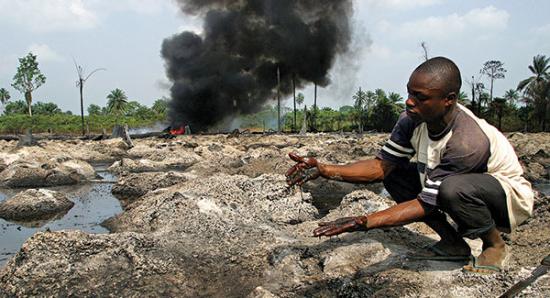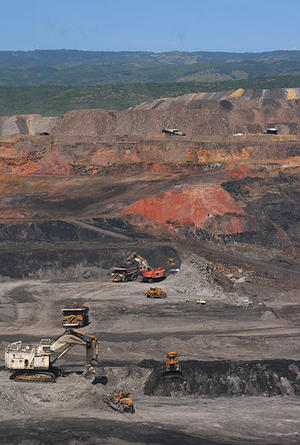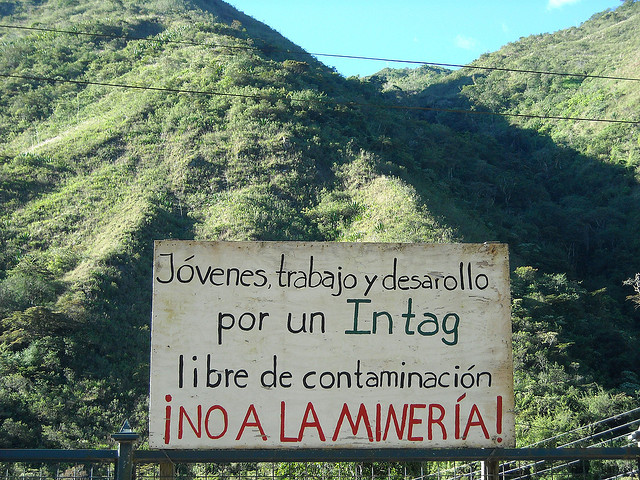Features
SYRIA BETWEEN IRAQ AND A HARD PLACE

The Syria Dilemma
Nader Hashemi & Danny Postel, editors
Boston Review Books, MIT Press, 2013
by Bill Weinberg, Middle East Policy
An illustration of the very dilemma referenced in the title of The Syria Dilemma is that several contributors to this timely book cite 75,000 dead in the conflict; the figure is now above 100,000. The anthology, which saw print just as Obama threatened intervention in the wake of the August 2013 chemical attacks near Damascus, compiles editorials and policy recommendations produced in the preceding months. Co-editors Nader Hashemi and Danny Postel try to be objective, assembling both pro- and anti-intervention voices. With few exceptions, these exemplify the tunnel-vision that characterizes both sides, forestalling a painfully honest reckoning.
THE FAR RIGHT IN UKRAINE: A NEW ORDER?

by Cas Mudde, openDemocracy
The Euromaidan "revolution" will undoubtedly remain one of the key political events of 2014. Most domestic and foreign observers were completely taken by surprise by the events that followed President Viktor Yanukovych's decision not to sign an integration treaty with the European Union (EU) in November 2013. While the initial demonstrations in downtown Kiev were somewhat expected, few had ever thought that they could spiral so out of control that, just three months later, a democratically elected government with one of the most popular politicians in the country was forced out of power.
Euromaidan has also been interesting in terms of the propaganda battle that has been fought in the traditional and social media. As is now standard for "revolutions" in the twenty first century, activists were quick to set up several Facebook pages, Twitter accounts, and other websites to provide their own positive view of the ‘revolution,’ countering the negative reports from the official Ukrainian media and, particularly, the largely Kremlin-controlled Russian media. They were very successful in disseminating their message, in part through networks of sympathizers in the west (including Ukrainian émigré communities in North America and post-Soviet scholars across the globe).
One of the main struggles has been over the importance of "fascists" in the Euromaidan. Almost from the beginning the pro-Kremlin media emphasized the importance of "Ukrainian fascists" among the anti-government demonstrators, and within days the whole uprising was to be portrayed as "fascist." This was to be expected, as both Soviet and post-Soviet Russian elites have tended to equate Ukrainian nationalism with fascism, linking any and every anti-Soviet or anti-Russian movement to the infamous Organization of Ukrainian Nationalists (OUN) of Stepan Bandera, which (temporarily) collaborated with Nazi Germany in a misguided attempt to gain Ukrainian independence from Stalin's brutal Soviet regime.
At the same time, most domestic and foreign sympathizers of "Euromaidan" have minimalized the importance of the far right, arguing that Euromaidan was a genuine democratic and pro-European uprising in which far right elements were insignificant.
COINTELPRO AND DIVISIVE HATE

by Bill Weinberg, World War 4 Report
The very point of the FBI's COINTELPRO strategy of the 1960s was paranoia, divisive hatred, and ultimately cannibalization of radical opposition movements in the United States. And it was grimly successful. Now that there are signs that US police agencies are reviving such tactics, it is imperative that activists learn from the mistakes of their counterparts two generations ago, and find rational, principled, humane and above all tactically astute ways to respond.
WAR AND WOMEN'S RIGHTS
What Does the Future Hold for Afghan Women?

by Elayne Clift, Toward Freedom
Back in the 1920s things looked hopeful for women in Afghanistan. King Amanullah Khan and his wife Queen Soraya worked diligently to improve women’s lives. The king discouraged polygamy, advocated against the veil, and pushed for greater personal freedom for females. "Tribal custom must not impose itself on the free will of the individual," he said. His sister, Kobra, created the Organization for Women's Protection while another sister established a women’s hospital. Queen Soroya even founded the first magazine for women.
By the end of this progressive decade conservative tribal leaders pushed back against the growing freedoms for women and the King’s successor acquiesced. Still, urban women entered the work force in the 1930s, mainly as teachers and nurses, and by 1959 many had unveiled. A1964 constitution gave women the right to vote and to enter politics.
All of these advances, and those that followed in the 1970s and 80s came to a crashing halt when the Taliban came to power in 1996 following Soviet [backed] rule. Their brutal oppression of women symbolized by blue burkhas and stoning deaths is familiar to most of us by now.
Post-Taliban, things seemed to improve. A woman was elected to the Loya Jirga in 2003 and the following year a new constitution codified that "the citizens of Afghanistan—whether man or woman—have equal rights and duties before the law." In 2008 the first political party dedicated to women's rights was launched and 35 percent of the more than five million children enrolled in schools were girls.
That was also the year that acid attacks on female students began.
MEGA-MINING IN URUGUAY: TIME TO VOTE?

by Luis Manuel Claps, NACLA
Picked by The Economist as country of the year and celebrated by Nobel Prize winner Mario Vargas Llosa in an El País op-ed, Uruguay is one of the most popular countries these days. Vargas Llosa's "The Uruguayan Example" (El ejemplo uruguayo), reminds us that "unlike many Latin American countries, Uruguay has a long and strong democratic tradition." New laws legalizing gay marriage and cannabis confirmed its progressive stance. But this rosy image is challenged by the single largest private investment in the country's history. Resistance to a large-scale mining project could show the limits of democracy in Uruguay—or perhaps expand them further.
SLIPPERY JUSTICE FOR VICTIMS OF OIL SPILLS
Nigerian Villagers Lose Lawsuit Against an Oil Giant

by Yemisi Akinbobola, Africa Renewal
In a stunning and dramatic legal ruling that echoed from the serene court chambers in the Netherlands to the heart of rural Niger Delta in Nigeria, the District Court of The Hague dismissed all but one of the lawsuits brought against Royal Dutch Shell, an Anglo-Dutch oil and gas company, by a group of farmers seeking compensation for the environmental damage caused by the company.
The lawsuit was filed in 2008 by four fishermen and farmers accusing Shell of ruining their livelihoods through environmental degradation. The claims centred on oil spills that occurred between 2004 and 2007 at the Ibibio-I oil well in the village of Ikot Ada Udo in Akwa Ibom State. The villagers wanted Shell to repair the damages caused to their communities by cleaning up the oil spillage, adequately maintaining pipelines to prevent future leaks and paying compensation for loss of livelihoods.
EMPIRES OF GOLD
Colombian Extractivism Today

by Luke Finn, NACLA
Before there was Colombia, there was the extractive industry.
The legend of El Dorado stems from a Spaniard, Juan Rodriguez Freyle, watching a High Priest of the Muisca getting covered in gold dust and jumping in Lake Guatavita, near Bogotá, in a religious ceremony that makes the Pope's big hat and incense-burning look fairly underwhelming. Naturally, the Spanish saw this profligacy as wrongheaded veneration of the Sun God Sue, decided that they themselves were far better placed to use all the gold responsibly, and set about destroying the complex societies that had flourished in Colombia prior.
Legends of cities of gold (La Ciudad Blanca, the Seven Cities of Cibola) drove men who nowadays would rightly be considered genocidaires (or go-getting entrepreneurs in the global commodities market) across the Atlantic, far from their families, to an uncertain fate—an alien environment full of strange gods, beautiful birds, jeweled beetles. The Spanish Empire was built on this gold (and other commodities they could "extract," worked by the stolen people of another ravaged continent.) The Muisca did less well.
Such was the conquest of the New World, and the Spanish didn't know the half of it.
ENEMY OF THE STATE
The Battle Over Sustainable Development in Ecuador's Intag Valley

by Gerard Coffey, La Linea de Fuego
QUITO — Born in Cuba, Carlos Zorrilla left the island when he was 11 and emigrated with his family to the United States. But the promised land did not live up to his expectations. Like many of his peers he found it hard to accept the war his adopted country was waging in Vietnam, not to mention the politics of then President Richard Nixon. So he left, looking for somewhere to live in peace. In 1978 he found himself in the Intag valley in Northern Ecuador where, he tells, he found an attractive agricultural area populated by solid and supportive communities. So he stayed. "I love agriculture," he says with a smile.
Attractive is probably an understatement. Intag, located in the western foothills of the Cotacachi volcano in Imbabura Province, some 150 miles south of the Colombian border, is warm, green and unequivocally beautiful. Populated in the late nineteenth century by families that migrated from other parts of the province, the area is a subtropical and primarily agricultural district with plenty of water, high levels of biodiversity and spectacular landscapes.
But the story of Zorrilla and Intag is not one of bucolic bliss. As he found out, peace and harmony do not come so cheaply. There is copper in the hills, and twice in recent decades mining companies have come looking for minerals to exploit.















Recent Updates
1 min 42 sec ago
8 min 42 sec ago
22 min 42 sec ago
33 min 42 sec ago
1 hour 1 min ago
1 hour 23 min ago
1 hour 38 min ago
1 hour 49 min ago
1 day 2 hours ago
1 day 10 hours ago